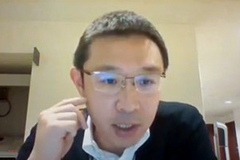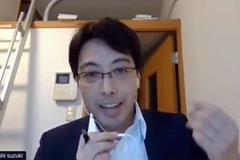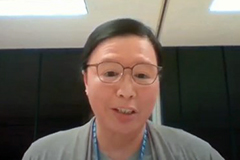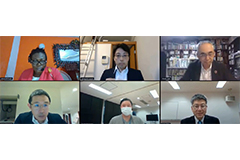The Importance of Evidence in Development Cooperation: JICA Ogata Research Institute Hosted a Parallel Session at the GDN Annual Conference
2022.01.31
From October 18-27, 2021, the annual conference of the Global Development Network (GDN) was held online. GDN’s objectives are research capacity development in developing countries and networking. The conference was titled “Evidence for Development: What Works Global Summit 2021” and over 900 people attended, including researchers and policymakers from around the world and representatives of international organizations.
On October 26, the JICA Ogata Sadako Research Institute for Peace and Development (JICA Ogata Research Institute) hosted a parallel session titled “The Importance of Evidence for Development in International Cooperation.” Takahara Akio, executive director, and research fellows of the institute, Taguchi Shimpei, Suzuki Tomoyoshi and Lisette Robles, participated.
At the start of the session, Takahara, who served as the moderator, mentioned in his remarks that the COVID-19 pandemic is a turning point for evidence-based development. He then said, "With the recent advancement of digitalization, we are living in an age of rapid change where conventional wisdom is no longer applicable. In addition, given the global movements towards carbon neutrality and response to climate change, the world will face an even greater challenge in the medium- to long term. In such a situation, evidence becomes even more important."
Next, Taguchi made a presentation titled “Measuring the Impact of Development Project Improving the Access to Safe Water in Rural Zambia.” In this presentation, Taguchi talked about an impact evaluation study on a construction project for borehole water supply facilities implemented in 2013 by JICA in the Luapula Province of northern Zambia. The study was conducted as part of JICA Ogata Research Institute’s research project, “Empirical Research in Africa.” The study compared the number of diarrhea cases and children’s school attendance rate and daily schedule, before and after the construction of borehole water facilities. Results showed that although the incidence of diarrhea had dropped, there was no positive effect on school attendance, and since sufficient clean water now became available, the amount of time spent by children to carry out household chores like water fetching had actually increased. Taguchi mentioned that he originally expected the burden on children caused by water-fetching chores would be reduced by the construction of the borehole water facilities and school attendance rates would improve. However, it became clear that in reality, the construction brought negative impact on girls' school attendance. He concluded that both positive and negative impacts must be understood, especially when considering the expansion of a development project, and therefore impact evaluations are all the more extremely important.

JICA Ogata Research Institute Research Fellow Taguchi Shimpei
Suzuki’s presentation titled “Understanding the Current Situation in Developing Countries: The Research on the Spillover Effect of Urban Transportation Infrastructure” followed. In this presentation Suzuki indicated that finance is a bottleneck in urban transportation development, but once transportation is built, it will attract more private investments in nearby areas, and furthermore, government revenue from property taxes will continuously increase as real estate development will show progress. To give an example of such spillover effects, Suzuki introduced a case study in Medellín, Colombia, where the construction of new mass transit systems increased property values by 2.9%, 2.7% and 1.9% in areas near metros, light rail transits (LRT) and cable cars, respectively. Suzuki suggested governments tap into these spillover effects as a means to help achieve financial sustainability of transportation infrastructure. He also suggested that they take into consideration possible spillover effects from an early stage like at the time of making the master plan. This is because it would take a lot of time to change how revenue from property taxes is used as this would involve changes in government policies. He also pointed out the need for evidence for consensus building between stakeholders as well.

JICA Ogata Research Institute Research Fellow Suzuki Tomoyoshi
Finally, Robles gave a presentation titled “Researching Human Security During Insecure Times,” in which she talked about the challenges and their solutions when conducting studies during the COVID-19 pandemic under JICA Ogata Research Institute’s research project “Human Security and Practices of Empowerment in East Asia.” Robles explained how the participating researchers had to adjust their research methods in identifying human security threats because of the pandemic. For example, where the research site is in heavy lockdown, local research assistants living in such communities themselves were the data sources. Another scenario is when the study subjects were spread around different locations in lockdown areas, and online surveys were directly sent to the study subjects. Further, where travel restrictions were in place, alternative study subjects were sought with the help of local researchers and interviewed (proxy interviews). Robles said that in human security research, quantitative and qualitative methods need to be combined to cover the shortfalls of both approaches. She concluded that human security research will continue to be critical both as a subject of inquiry and a starting point in shaping consistent policy responses. More so, researchers should look into adaptable approaches to understanding the cascading and overlapping insecurities people face and how to address them to move studies forward even during this pandemic.

JICA Ogata Research Institute Research Fellow Lisette Robles
These presentations received comments from Akua Arthur-Kissi, principal evaluation officer of the African Development Bank, and Sato Hiroshi, chief senior researcher of the Research Planning Department at IDE-JETRO, and deeper discussion took place. Akua raised an issue on the use of evidence. She said evidence from an impact evaluation helps us make important decisions about whether we should invest more and whether the project can be replicated in a similar setting, it also helps to understand where the actual change happened or not as a result of the intervention, etc. She stressed that researchers need to endeavor to make their research rigorous, timely and ask themselves whether evidence from an impact evaluation is helpful to make such critical decisions when needed. Sato commented on the political aspects of evidence. He said evidence is the basis for consensus but the perception of an evidence differs greatly among individuals. Also, consensus making has a political dimension. So, the question we need to ask ourselves is how to use evidence as a tool for agreement, he said. Takahara responded to this by saying that project implementation in itself can be seen as a political process, involving numerous actors with a variety of interests. He went on to say that researchers should not think their work ends when the research findings are published. They should not forget, as practitioners, the perspective of improving people’s lives by using evidence-based research findings.

Evidence in development cooperation was actively discussed in the discussion session
In the discussion session that followed, evidence in development cooperation was actively discussed. For example, when asked what kind of projects should be selected to conduct evidence-based studies since a lot of time and effort are required in getting evidence, Taguchi answered that impact evaluations should be conducted for a project at the pilot stage to assess the possibility of project expansion. Meanwhile, Suzuki said that impact evaluations should be conducted when there is a need for a study to identify the best policy from multiple options or in the case of projects that cost a huge amount and create accountability toward the general public, like transportation infrastructure projects. Features of both quantitative and qualitative evidence and how to combine them were also discussed, involving topics such as the importance of qualitative evidence in interpreting quantitative evidence.
Panel 24.2 | The importance of evidence for development in international cooperation (JICA-RI)(GDN YouTube Channel)

事業事前評価表(地球規模課題対応国際科学技術協力(SATREPS)).国際協力機構 地球環境部 . 防災第一チーム. 1.案件名.国 名: フィリピン共和国.

事業事前評価表(地球規模課題対応国際科学技術協力(SATREPS)).国際協力機構 地球環境部 . 防災第一チーム. 1.案件名.国 名: フィリピン共和国.

事業事前評価表(地球規模課題対応国際科学技術協力(SATREPS)).国際協力機構 地球環境部 . 防災第一チーム. 1.案件名.国 名: フィリピン共和国.

事業事前評価表(地球規模課題対応国際科学技術協力(SATREPS)).国際協力機構 地球環境部 . 防災第一チーム. 1.案件名.国 名: フィリピン共和国.

事業事前評価表(地球規模課題対応国際科学技術協力(SATREPS)).国際協力機構 地球環境部 . 防災第一チーム. 1.案件名.国 名: フィリピン共和国.
scroll